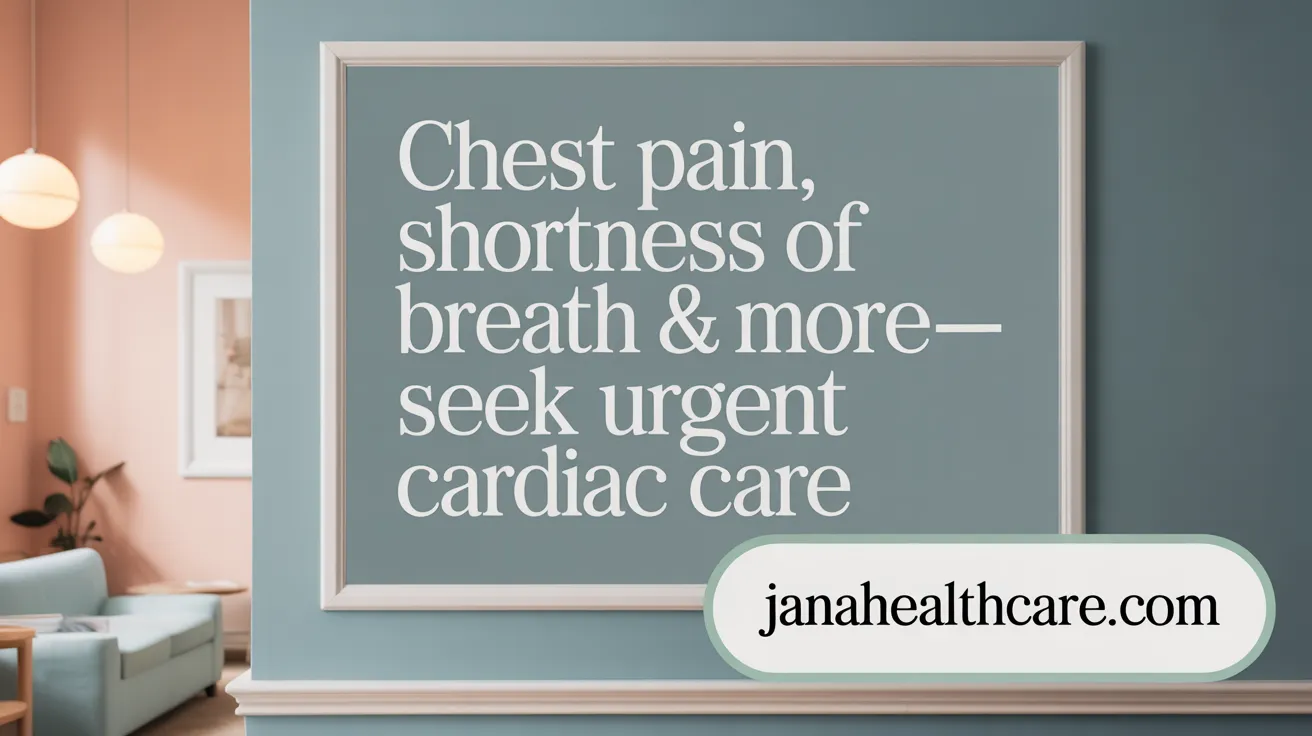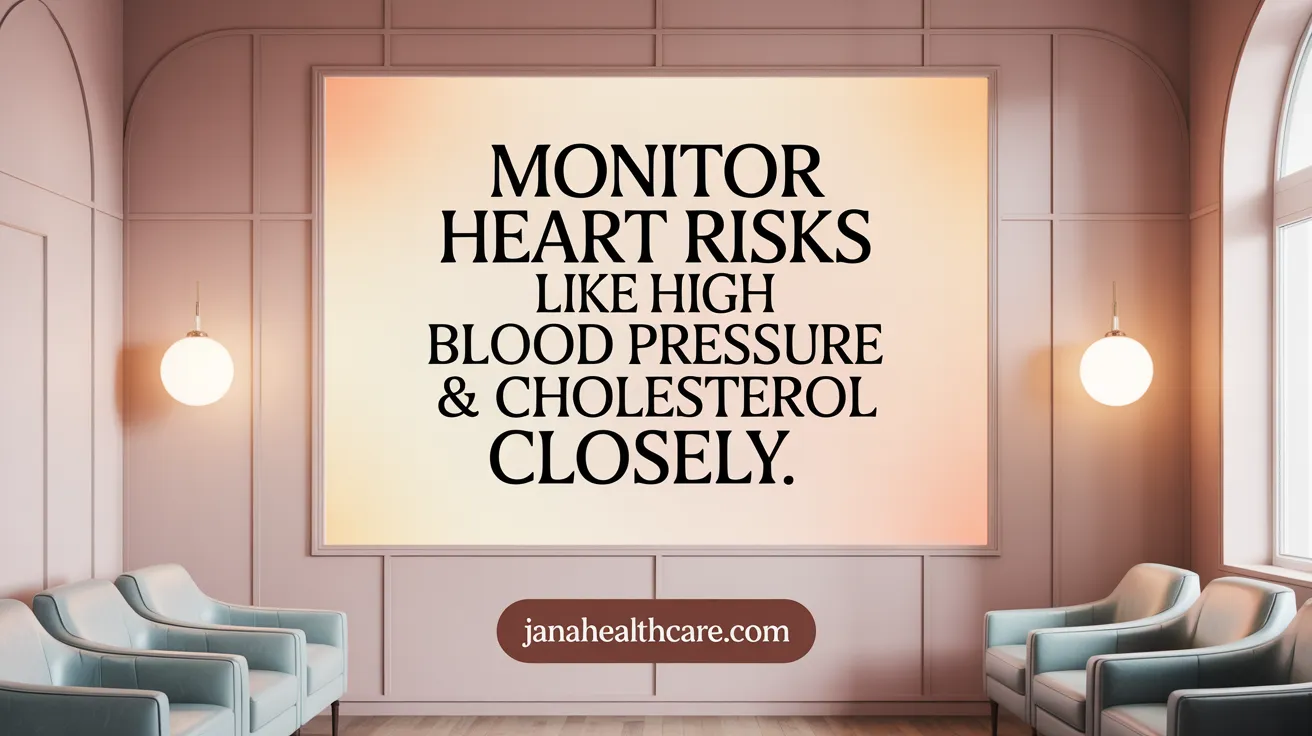The Importance of Timely Cardiology Check-Ups
Heart disease remains the leading cause of death globally, often progressing silently before symptoms become evident. Recognizing when to seek the expertise of a cardiologist can be lifesaving. This guide outlines key signs, risk factors, and screening protocols to help individuals make informed decisions about their heart health.
Common Symptoms That Signal a Need for Cardiologist Evaluation

What symptoms indicate it’s time to see a cardiologist?
Symptoms such as chest pain that worsens with activity, known as angina, shortness of breath, palpitations or irregular heartbeat, dizziness, fainting, swelling in legs or ankles, and unexplained fatigue may all point to underlying heart problems. These signs warrant prompt evaluation by a cardiologist to diagnose and manage potential cardiovascular conditions effectively. See more on Signs it's time to see a cardiologist.
What does chest pain related to heart disease feel like?
Chest pain from heart disease often presents as pressure, heaviness, tightness, or a sharp burning sensation under the sternum. This discomfort can also radiate to other areas such as the neck, jaw, arms, back, or stomach. Chest pain that improves with rest is typically characteristic of angina, signaling inadequate blood flow to the heart muscles.
Shortness of breath
Shortness of breath during activity or even at rest can indicate heart conditions such as heart failure or coronary artery disease. It occurs when the heart cannot pump efficiently, leading to fluid buildup in the lungs. For additional insights see Shortness of breath and heart disease.
Heart palpitations
Feeling of irregular, skipped, or rapid heartbeats, also called palpitations, can signal arrhythmias or other cardiac issues. Persistent or worsening palpitations should be assessed by a cardiologist. See more on heart palpitations and underlying issues.
Dizziness and fainting
Episodes of dizziness and fainting may occur due to abnormal heart rhythms or insufficient blood flow to the brain, necessitating specialized cardiac evaluation. Learn about dizziness and fainting as heart symptoms.
Swelling in legs or ankles
Swelling, especially in the lower extremities, often results from poor heart function leading to fluid retention. It can also suggest peripheral artery disease that requires cardiology assessment.
Fatigue related to heart conditions
Unexplained, persistent fatigue that interferes with daily activities may be a symptom of heart failure or ischemic heart disease, highlighting the need for cardiologist consultation. More details at early warning signs of heart disease.
Pain radiating to other body areas
Pain spreading to shoulders, arms, jaw, neck, back, or upper belly often accompanies heart-related chest pain and should not be ignored as it can be a warning sign of a heart attack or coronary artery disease. For detailed heart attack symptoms and how to respond, see Heart Attack Symptoms and Prevention.
Key Risk Factors and When to Monitor Heart Health Closely

Who should consider seeing a cardiologist even without symptoms?
People with certain risk factors should have regular check-ups with a cardiologist, even if they don't have symptoms. These include those with uncontrolled high blood pressure risks, as high blood pressure strains the heart and raises risks of heart attack and stroke. High cholesterol contributes to plaque buildup in arteries, increasing the chance of blockages and heart attacks, and needs management under cardiology care. Diabetes raises cardiovascular risk by damaging blood vessels, making specialist monitoring important. Smoking is a major preventable risk factor that worsens heart health and increases high blood pressure and artery damage. Individuals who are obese face elevated risks including high blood pressure, cholesterol issues, and diabetes, all affecting heart health. Chronic kidney disease is linked with arterial problems and raises heart disease risk, warranting cardiology involvement. Those with a family history of early-onset heart disease should see a cardiologist to assess and manage their risks proactively.
How do genetics influence the need for cardiology care?
Genetics play a significant role in heart disease risk. Having close family members who developed coronary artery disease before age 55 in men or 65 in women increases your personal likelihood of heart problems. Such genetic predispositions may require earlier and more frequent cardiovascular screening. Cardiologists can evaluate genetic factors through history and testing, offering prevention strategies tailored to inherited risks. Some genetic conditions cause extreme cholesterol elevations resistant to lifestyle changes, requiring specialized treatments. Early identification of genetic risks allows for timely interventions, preventing irreversible heart damage.
Understanding these risk factors and genetic influences enables individuals and doctors to monitor heart health closely and start early interventions to reduce the likelihood of serious cardiovascular events.
Routine Heart Health Screenings and Their Role in Prevention
What routine screenings help in early detection of heart disease?
Regular heart health screenings are vital to detect risk factors early, enabling timely preventive measures. Key screenings include:
- Blood Pressure Monitoring: High blood pressure significantly increases the risk of heart disease and stroke. It often has no symptoms, so routine measurement is critical. Learn more about blood pressure screening guidelines.
- Cholesterol Testing: A lipid profile assesses total cholesterol, LDL, HDL, and triglycerides. High cholesterol can lead to plaque buildup in arteries, raising heart attack risk. See cholesterol screening recommendations for details.
- Blood Glucose Screening: Testing for diabetes or prediabetes is important since elevated blood sugar damages blood vessels and heightens cardiovascular risk. More on blood glucose testing for heart health.
- Body Mass Index (BMI) Evaluation: BMI helps assess obesity-related risks, which can contribute to hypertension, diabetes, and heart disease. Understand the role of body mass index (BMI) and heart disease.
These measurements form the basis for assessing cardiovascular risk and determining the need for further cardiology evaluation. For comprehensive information on cardiovascular risk factors and preventive measures, see Understanding Heart Disease Symptoms and Risk Factors.
How often should heart health screenings be performed?
Screening frequency depends on age and risk factors:
- Blood Pressure: Should be checked at least once per year for adults with normal readings (below 120/80 mm Hg). More frequent monitoring is necessary if blood pressure is elevated, as explained in Blood Pressure Screening Guidelines.
- Cholesterol: Recommended every 4 to 6 years for people at average risk, with more frequent tests if risk factors like family history or existing disease are present. Details are available in Cholesterol Screening Recommendations.
- Blood Glucose: Advised at least every three years starting at age 45, or earlier and more often for overweight individuals or those with additional risk factors. Refer to Blood Glucose Testing Frequency.
- BMI and Weight: Usually assessed during regular health visits to help monitor lifestyle-related risk, with information on Routine Body Weight Assessment.
Along with these tests, lifestyle assessments involving diet, physical activity, smoking status, and other health behaviors play a crucial role in comprehensive cardiovascular risk management. Early detection through routine screenings combined with lifestyle optimization supports heart disease prevention and improved long-term health outcomes. For more on managing cardiovascular risk factors and screenings, see The Importance of Regular Heart Screenings.
Diagnostic Tests Cardiologists Use to Assess Heart Health
What diagnostic tests might a cardiologist order during a check-up?
During a cardiology visit, several diagnostic tests may be ordered to evaluate heart health effectively.
-
Electrocardiogram (ECG or EKG): This test measures the heart’s electrical activity to detect abnormal rhythms, past or current heart attacks, and other electrical problems. Learn more about Electrocardiogram (ECG or EKG).
-
Echocardiogram: Utilizing sound waves, this imaging examines heart muscle, valve function, and overall heart performance by producing detailed pictures of heart structures. See details on Echocardiogram.
-
Stress Testing: Includes exercise stress tests and pharmacologic stress tests. These assess how the heart performs under physical exertion or medication-induced stress to reveal blood flow problems or rhythm issues. For more information, visit Exercise stress tests and pharmacologic stress tests.
-
Cardiac MRI and CT: These imaging techniques provide detailed cross-sectional views of the heart, assessing structure, scarring, valve conditions, and detecting artery blockages. Learn about MRI heart scans and CT heart scans.
-
Ambulatory Rhythm Monitoring (Holter Monitor): This involves monitoring the heart’s rhythm continuously over 24 hours or longer to detect intermittent arrhythmias. More details about Ambulatory rhythm monitoring.
-
Coronary Angiography: An invasive procedure where dye is injected into coronary arteries to visualize blockages or narrowings, providing critical information about coronary artery disease. Find out about Coronary angiograms.
-
Calcium Scoring: A noninvasive CT scan that measures calcification in coronary arteries, helping to evaluate the risk of coronary artery disease. Read more about Calcium scoring tests and coronary artery disease screening.
These diagnostic tools allow cardiologists to obtain a comprehensive understanding of heart function and detect conditions early, guiding appropriate treatment and preventive strategies.
Understanding When to Seek Emergency Cardiac Care

What symptoms require immediate emergency attention?
Severe chest pain or discomfort lasting more than a few minutes is a primary warning sign of a heart attack. This pain may feel like pressure, squeezing, tightness, or heaviness. If you experience pain that radiates from the chest to other areas such as the arms (especially the left arm), jaw, neck, back, or stomach, it signals a serious cardiac event (Chest pain and heart disease, Chest discomfort and heart disease, Chest pain and heart disease).
Other critical symptoms include sudden shortness of breath, excessive sweating (often cold or clammy), nausea or vomiting, dizziness, and fainting. These signs may indicate either a heart attack or a stroke, both of which require immediate medical response (Warning signs and symptoms of heart disease, Warning Signs of Heart Attack).
Why is immediate action important?
Delays in seeking emergency care during these symptoms can lead to irreversible heart muscle damage or stroke-related brain injury. Quick recognition of these warning signs and calling 911 can save lives and improve recovery outcomes by ensuring rapid treatment (Chest pain and heart disease, When to see a cardiologist).
What should you do?
If you or someone around you experiences these symptoms, call 911 immediately rather than driving to the hospital. Emergency medical personnel can provide life-saving interventions en route to the hospital and help manage complications (Heart disease symptoms and emergency care, Warning Signs You Should See a Cardiologist).
Recognizing the urgency of symptoms like severe chest pain, radiating pain, sweating, nausea, and breathlessness is essential for timely cardiac care and minimizing the risk of death or severe disability (When to see a cardiologist, Signs You Need to See a Cardiologist.
Preparing for Your First Cardiology Appointment and What to Expect
What happens during a first cardiologist appointment?
During your initial visit to a cardiologist, you can expect a comprehensive evaluation of your heart health. The appointment usually lasts around 40 minutes and begins with a detailed review of your personal and family medical history. The cardiologist will discuss any symptoms you may be experiencing, such as chest pain, shortness of breath, or palpitations.
A physical examination will follow, including measuring your vital signs like blood pressure and heart rate. The doctor will also listen to your heart and lungs to detect any abnormalities. Common diagnostic tests at this stage include blood work to assess cholesterol and glucose levels, electrocardiograms (ECGs) to check your heart's electrical activity, and chest X-rays to view heart size and lung condition.
After this comprehensive assessment, the cardiologist will explain the findings, recommend any additional testing if needed, and discuss possible treatment plans. This may involve lifestyle changes or medications to support your heart health.
How can patients prepare for their cardiology visit?
To make the most of your cardiology appointment, preparation is crucial. Bring a list of all current medications, including dosages and supplements, and any previous heart-related test results or medical records. Dressing in loose, comfortable clothing is advisable to ease the physical examination and tests.
Prepare a list of questions or concerns you have about your heart health, symptoms, treatment options, or warning signs that would require immediate medical attention. This proactive approach helps you engage actively in your care and ensures your concerns are addressed. Learn more about what to expect at your first cardiology appointment.
Importance of follow-up and lifestyle changes
Regular follow-ups with your cardiologist help monitor your condition and adjust treatment plans as necessary. Implementing recommended lifestyle changes — such as adopting a heart-healthy diet, quitting smoking, managing stress, and staying physically active—plays a critical role in improving your heart health and preventing complications.
Working closely with your cardiologist enables early detection of issues and tailored management to maintain optimal cardiovascular well-being. For additional insights on when to see a cardiologist and importance of regular heart check-ups, please refer to these resources.
Proactive Care: A Lifeline for Heart Health
Understanding when to consult a cardiologist is essential to address heart disease proactively. Recognizing symptoms, managing risk factors, undergoing routine screenings, and engaging in early diagnostic testing can substantially reduce the risk of serious cardiac events. Regular check-ups enable personalized care plans that encompass lifestyle interventions, medication, and when necessary, advanced treatments. By being attentive to your heart’s signals and maintaining ongoing dialogue with healthcare professionals, you take vital steps towards safeguarding your cardiovascular health and improving long-term outcomes.
